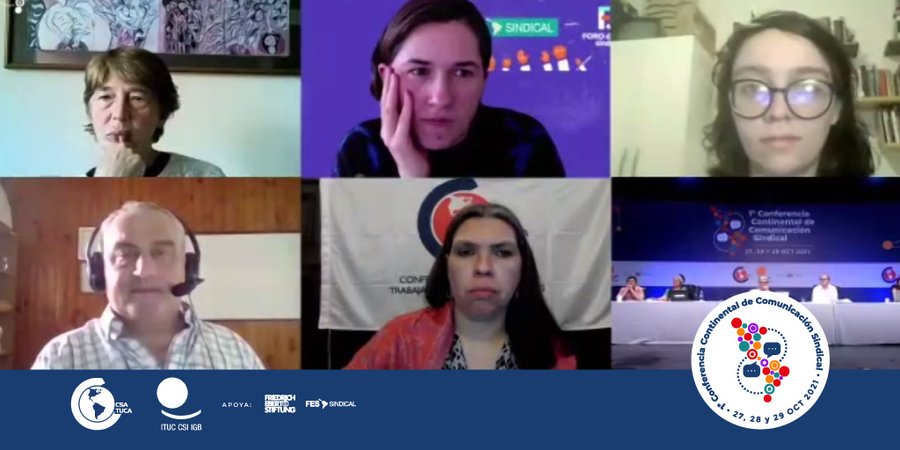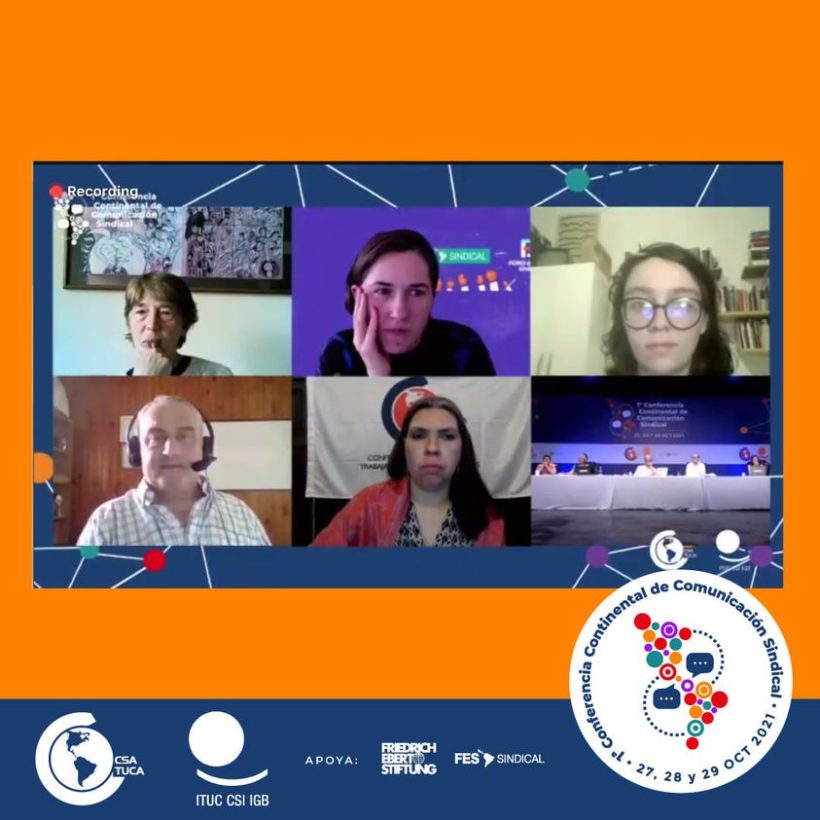The First Continental Conference on Trade Union Communication, which took place between 27 and 29 October, dedicated its second day to the theme of Popular Communication.
As stated in the Road Map collectively debated within the different centres and sectors that make up the Trade Union Confederation of the Americas, organiser of the event, “popular communication is a political commitment of the social movements and popular organisations”.
of social movements and popular and trade union organisations with a long trajectory in the Americas”.
From the impulse of democratising communication and achieving greater articulation of popular communication processes in the region, the Conference highlighted important experiences of articulating popular mobilisation with their own communication, which resulted, for example, in the Campaign against the FTAA, the result of which was the defeat of the imperial ambitions of continental domination.
At the same time, the capacity and enormous potential of the thousands of community, alternative and popular media existing on a continental level and their articulations “to produce networked content, to carry out journalistic coverage that prioritises and makes visible the agenda of working class mobilisation against neoliberalism and in favour of democracy, and to deal with issues of international relevance, such as feminism, the anti-racist struggle and environmental justice, with a critical and popular perspective”, as indicated in the aforementioned Road Map, was highlighted.
Cícero Pereira da Silva, TUCA Secretary for Trade Union Training and Education, was in charge of the presentation of a summary of the axis dedicated to Popular Communication of the document to be approved by the present conference.
Then, in line with the aim of continuing to build and deepen alliances between the various communication expressions of the social, trade union, territorial and sectoral movements, there was space on this second day for the participation of members of various allied communication collectives.
With the moderation of the Secretary of Social Policies of the TUCA, Jordania Ureña Lora, Helena Zelic, from the World March of Women, José Elosegui on behalf of Real-World Radio and María Paula Martínez, from FES Comunicación, participated in this round table.
The presentations were completed by Sally Burch from the Latin American Information Agency (ALAI) and Javier Tolcachier, a communicator from Pressenza, in his capacity as facilitator of the Communication Forum for the Integration of Our America (FCINA).
The day, coordinated by the Secretary General of the TUCA, Rafael Freire Neto, concluded with a rich internal debate that was led by the numerous attendees, mostly delegates from the various constituent centres of the trade union organisation.

Below we transcribe in full the contribution of Pressenza communicator and FCINA facilitator, Javier Tolcachier.
Question: As a regional forum that integrates different experiences in relation to communications, we asked Javier to share with us how the FCINA analyses the attack on trade union and labour rights, particularly within the framework of the popular communication agenda that they defend.
One of the main motivations of popular, community, alternative and sectoral communication is precisely the defence and advancement of the rights won by the people in arduous struggle. In contrast, the media, concentrated in the hands and at the service of capital, cartelise their discourses, both in traditional vehicles and in the digital space, with the aim of obstructing and trying to stop this historic current.
This produces the strange phenomenon that the capitalist failure to guarantee equitable welfare for the world’s population is presented as a successful and unique model, transferring to the public imagination a distorted and self-interested vision of the surrounding facts.
This vision is repeated over and over again, clouding the subjective horizon whenever organised social forces lead and promote possibilities for change. The rule is: the deeper and more real the proposed change, the more brutal the attack.
In other words, capital attacks workers’ rights not only with the aim of maximising its profits, but it also tries to take over, to appropriate individual and collective subjectivity in order to prevent any transformation.
We therefore welcome the fact that more and more social movements, in this case the trade union movement, are placing among their political priorities the redistribution of communication and the effective democratisation of the word, without which it will be difficult to advance in an accelerated manner the essential and urgent social conquest.
At the same time, the need to articulate diversity in order to fortify communication work in solidarity networks for the production and distribution of content in order to change the unjust balance of power in the construction of narratives is very clear today.
But communication works in the subjective field, so that it is not enough to analyse external conditions; it is necessary to delve deeper into the inner situation of the groups with whom we dialogue.
There we encounter contradictions that we need to understand in order to move forward.
One of these is the difficulty of achieving effective articulation in the face of a world of growing fragmentation. This tendency towards social atomisation is produced, among other things, by the dissolution of ties based on values weakened by changes in the human scenario, such as the growth of the urban population to the detriment of the rural community relationship, the modification of production systems and the introduction of individualistic beliefs. In this growing desert of uncertainty and disintegration, not only neoliberalism but also irrational fanaticisms that offer the excluded sectors containment, escape and a sense of identity based on particularity and difference.
All this conspires against the urgent need for convergence in common political and communicational projects that serve as a framework for overcoming economic and social violence against the subjugated majorities and for the expansion of rights and opportunities for all human beings.
Faced with this panorama, communication must not only be a voice of denunciation, complaint and vindication, but also a vector of essential and permanent critical reflection, fearlessly tackling the construction of new social and political paradigms that lead to collective growth and a life with a sense of humanity.
In addition to setting up and strengthening the spaces for the articulation of popular communication, by increasing alliances with all the social actors made invisible by the dominant discourse, it seems fundamental to us to emphasise the need to establish a public-community alliance to replace the nefarious public-private partnership typical of neoliberalism.
This public-community alliance, which we believe should only be possible within the framework of progressive or revolutionary governments, is the way for states to collaborate effectively, beyond the formality of their legal bodies, with the decentralisation of communication and the empowerment of transformative communication, without claiming to control it, which will undoubtedly contribute to greater real democracy, which is today demanded, above all, by the youngest people.
It is therefore particularly important for popular political movements and leaderships to propose a horizon of distributed popular communicational power, the only guarantor of social empowerment consistent with deep and permanent transformation projects.
In the same way, the advance of digitalisation in communication spaces makes it necessary for our movements and media to take decisive critical action against the mercantile logics that underlie their monopolistic position, aiming at the effective limitation of their power, but also at the development and use of those free tools that coincide in their design and are apt for strengthening the organisational base of communities and their mobilisation.
In short, the de-monopolisation of the communicational discourse together with the articulation and real integration of diversity in convergent socio-political projects aimed at the reconstruction of the social fabric and the social distribution of power, constitute today strategic keys to advance towards more just, dignified and humanised societies.
This is what we want to contribute to.
Thank you very much for the space.










